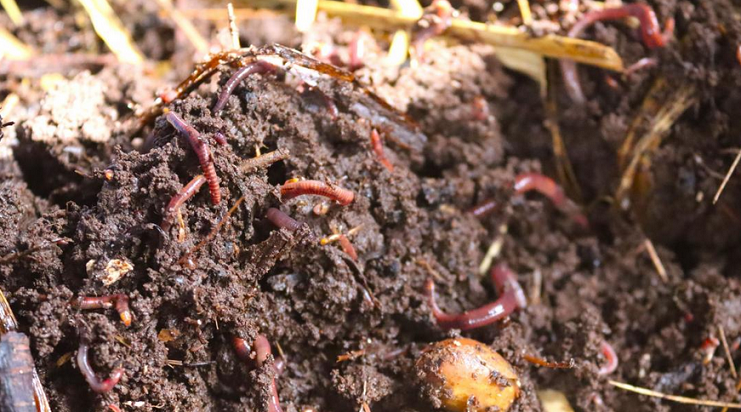As the demand for organic products continues to grow, many small-scale holder farmers are looking at alternative ways to produce organic crops that suit the needs of health-conscious consumers in the country. About 16 kilometers outside Masaka city in Busense village, such farmers are getting their answers to a new and rather odd farming practice, involving red earthworm rearing to tap the market opportunities.
Also known as vermiculture, the farming practice involves the rearing of red earthworms with the purpose of converting organic wastes into nutrient-rich compost for plants. Duncan Ssenoga, an assistant Agricultural Trainer at St. Jude Family Project in Masaka city has been training farmers and students in this area for the past two years on earthworm rearing.
He explains that the venture is a friendly process that helps reduce waste, improve soil health, and create a sustainable farming practice. Ssenoga notes that the worms are fed on locally available fruit peels, vegetables, kitchen wastes, cow dung, and leaf litter among others that are known to be high in organic matter. The process according to Ssenoga can be undertaken in a farmer’s backyard or designated space such as a greenhouse and shade since the worms thrive well in conducive temperatures.
According to Ssenoga, the practice is a good move since it has no harm compared to the use of chemical fertilizers that are known to cause harm to the soil and humans.
Getting started
To get started, a farmer can either use a plastic or wooden bin in which soil is mixed with vegetable, fruit wastes, cow dung, and water before the earthworms are introduced. Two years ago, Ssenoga said they bought two kilograms of earthworms from the Agency for Integrated Rural Development (AFIRD) in Wakiso District at Shillings 100,000.
According to Ssenoga, after 90 days, the worms had multiplied significantly due to their fast growth rate and within just three months, they were able to harvest 50 kilograms of compost fertilizer from the seven bins they established. He notes that the worms require regular watering at least two to three times a week for them to thrive and for a farmer to be able to collect termites (liquid fertilizer).
Business venture Philip Alexander Ampeire, an agricultural expert and senior trainer at St Jude Family project says besides rearing earthworms for organic fertilizers, farmers can also sell them to earn money as a business. Amperiere says a kilogram of the red earthworms can fetch a farmer 50,000 Shillings on the local market adding that their multiplication rate is fast since they are hermaphrodites.
He says that whereas the venture is still unpopular in the country, farmers ought to embrace the new innovation since it helps to promote sustainable farming practices that rely on naturally available materials and are generally less costly.
Currently, St. Jude Family Project is supporting about five farmers’ groups in Busense Village in vermiculture farming and a number of sustainable farming practices that are friendly to the environment and farmers’ health.
Naume Kalinaki, the acting Programs Officer in charge of Livelihood Development at the Eastern and Southern Africa small-scale Farmers Forum (ESAFF), says they are encouraging small-scale holder farmers to take on agroecology practice to overcome the challenges of climate change. She notes that agroecology is a sustainable means of farming that doesn’t deplete the soil nutrients and is less costly compared to conventional farming practices.
She says the advent of conventional farming; many indigenous seeds have since been modified leaving them less resistant to pests and climate change.
To tap into the global market on the growing demand for organic products, Uganda has made strides in passing a policy to promote organic agriculture. In 2020, the government rolled out the National Organic Agriculture Policy, which aims at providing guidelines for the production, processing, labeling, and marketing of organically produced foods.
Uganda currently ranks second on the global scene with the largest number of certified organic producers at approximately 210,352 next to India and boasts of an Export Market Value exceeding US$50m according to the Ministry of Agriculture, Animal Industry and Fisheries (MAAIF).
According to the Organic Food Global Market Opportunities and Strategies Report 2023, the Global organic food market reached a value of nearly US$215,350.2 million in 2022, having grown at a compound annual growth rate (CAGR) of 11.3 percent since 2017.
-URN






I wanted to know if I want to buy live Earth worms who to contact
Contact me on 0779210960 (Ssebandeke Ashiraf) to get worms